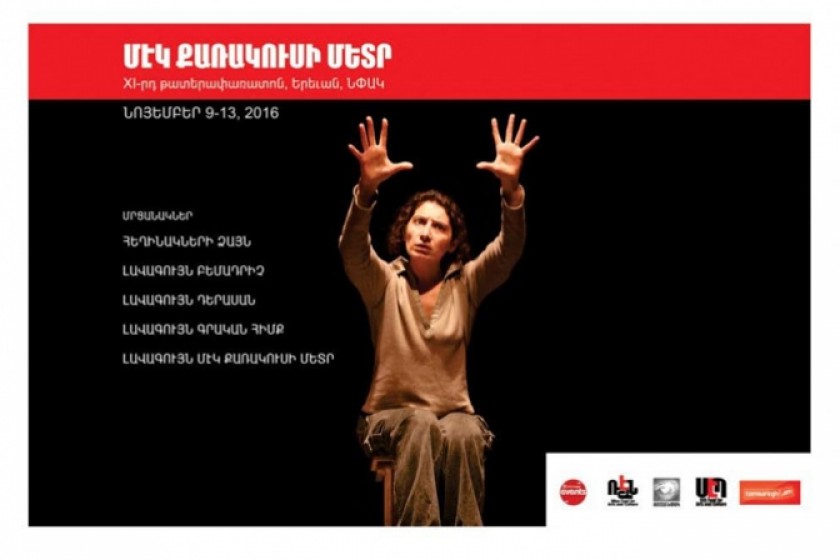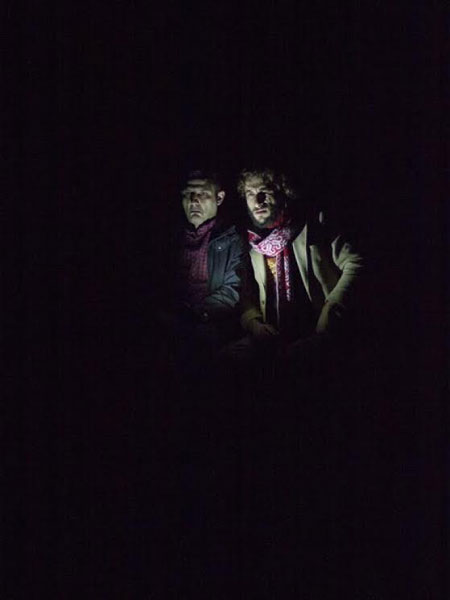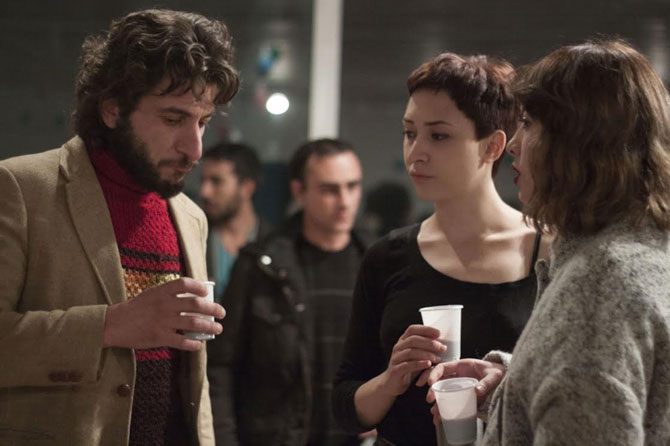
Small Theater: The One Square Meter Festival at Yerevan’s NPAK
By Lilit Vahanyan
They say people always go back to places they once loved or just felt peaceful in.
One of these places for me was Yerevan’sArmenian Center for Contemporary Experimental Art, or as most of us know it, NPAK. I used to be a freelance actress in the NPAK Theater back in 1999-2000. I played a part in Harold Pinter’s very weird and memorable play The Elevator.
When I read about the One Square Meter Theater Festival opening at NPAK, I felt that it was about time to return. I met my former director and very good friend, Gagik Ghazareh, the founder and the organizer of the Festival, who kindly answered my questions.
The story goes like this.
In 2001, the Arab director Mustapha Aouar, from France, came up with the idea to expose some conflicts and disasters from around the world and do it by means of short, seven-minute theatrical performances on a very small stage. The actors, from the conflict countries, would present their tragedy and ways to overcome it.
Their interaction was to show that there was a way out, a peaceful way. This took place in Yerevan, at NPAK, and Armenian actors were a part of it. Afterwards, the Festival traveled to Georgia, some former Yugoslavian republics and back to France.
Later, the Festival, in this format,ceased to exist but Gagik Ghazareh, his colleagues and NPAK Theater tried their best year after year to revive this eve in Armenia.
They finally made it happen in 2006.
 It started as a 4-person performance, the founder included, in a one square meter space and from that tiny space the journey started.
It started as a 4-person performance, the founder included, in a one square meter space and from that tiny space the journey started.
By the next year they already had 7-8 theatrical groups wanting to perform and the response from the audience was very encouraging.
The charm of the Festival is that the participants aren’t well known professionals. Gagik told me they have guys from the Yerevan Medical University wanting to perform and doing it very well.
And not only from there. This is a chance for beginners and experienced actors to interact, learn from each other, read monologues they always dreamed about and admired, thus giving them their own voice and interpretation.One of the most important things is that there are always discussions after the performances. Everyone interested can participate, express their opinion, and share their own experience.
Gagik Ghazareh gives great importance to this because he thinks this provides an educational angle to the Festival. They invite theater critics and art lovers, and everyone takes something home from this discussion; be it fresh interpretations of the performances they saw, advice from directors or just the warmth of meeting good people who love what they do.
Gagik is especially proud of this year’s Festival, saying that he already is witnessing the results of eleven years of hard and constant work. Many directors and actors from earlier years of the Festival are back this year, wishing to perform again. One of the directors, Garik Hovhannisyan,who won the Best Director award in the past, has established his own art center in his small hometown and has a theatrical troupe with a solid program.
The Festival has a professional jury of three that selects the Best Scenario, Best Actor/Actress, Best Director winners. There is also the Best One Square Meter performance which is decided by the founders of the Festival.
But the award I liked the best is the one that is decided by fellow directors and actors. They discuss and choose who was the best among themselves and present the Grand Prix to that group.
The Festival also gives a stage to solo performances. There is no limitation to expressing oneself. The only condition is not to overstep the one square meter.
When I asked Gagik has this ever put the actors into tight boundaries and interfered with the quality of their performance, he said that it’s exactly where the beauty of the challenge is.
The actor who can perform and address in that limited space can do anything. It is both a restriction and a freedom for the performer. They are both inside and the outside of the square. It’s completely up to the performer. And this makes people think creatively and open.
The One Square Meter helps performers to grow professionally. To gain confidence. To develop theatrical thinking. It’s an experience that almost brings down the wall between professionals and simple lovers to act.
To my question, was there a performance that he personally liked and remembered the most through these years, Gagik answered like a father who was asked which kid was his favorite. He is fond of all the performers and devoted supporters who kept the Festival alive for all this time.

One of the things the founder is sorry about is that now, with all the organizing and managing the Festival, he does not have much time to direct or perform himself.
The organizers are doing everything not to limit the freedom or their performers. They never ask them to play before the actual Festival. They have the scripts submitted from the groups and that is the extend of it. Performers are not being censored or told what to do in any other way. On the contrary, the improvised surprises are welcomed, especially if they are delivered with taste and style.
Some of the 10 performances within the competition to take place during the Festival include an interpretation of Samuel Beckett’s famous “Waiting for Godot” (director Tatev Hakobyan); a solo performance by Anna Terzikyan called “I’m Tired”; and a tragicomedy called “Disobedience” based on one of Anton Chekhov's stories. The other seven participants sound as interesting as these three. There also will be Special Program and of course the discussions.
The complete list of the activities is easy to find on NPAK’s official website.
The One Square Meter Festival runs until November 13. Admittance is free.
Lilit Vahanyan is a Yerevan translator and linguist by profession who loves multi-tasking and making change where possible. Her motto: the best rest is a good book and a glass of red.
 Videos
Videos Photos
Photos




Write a comment